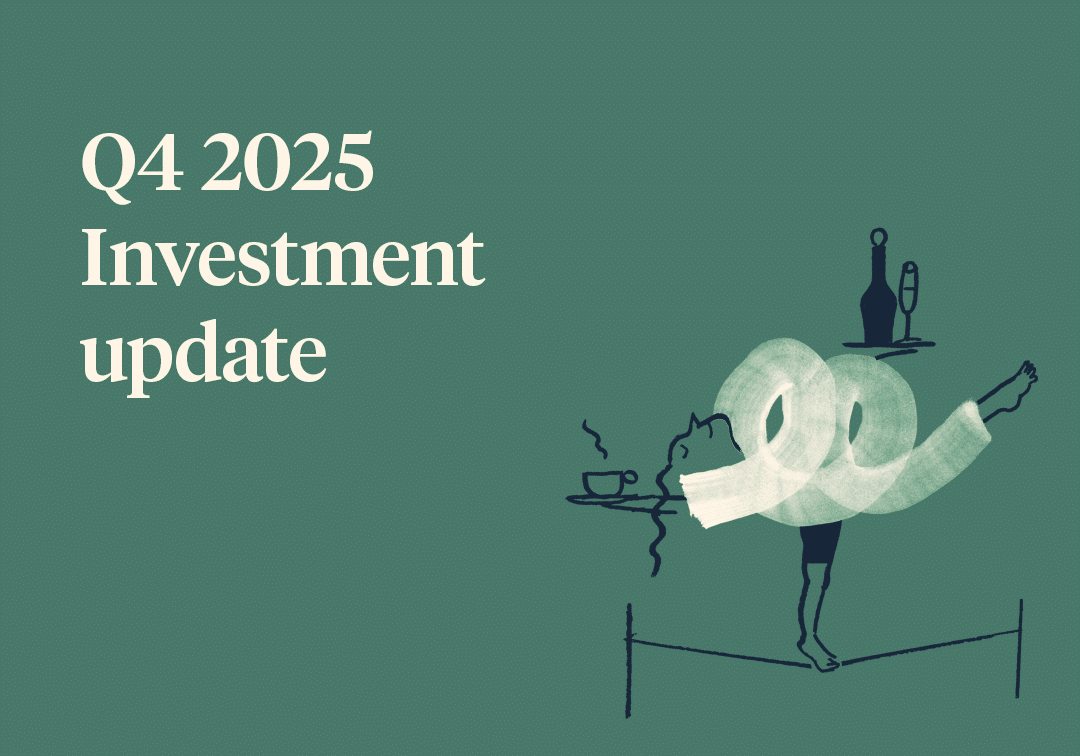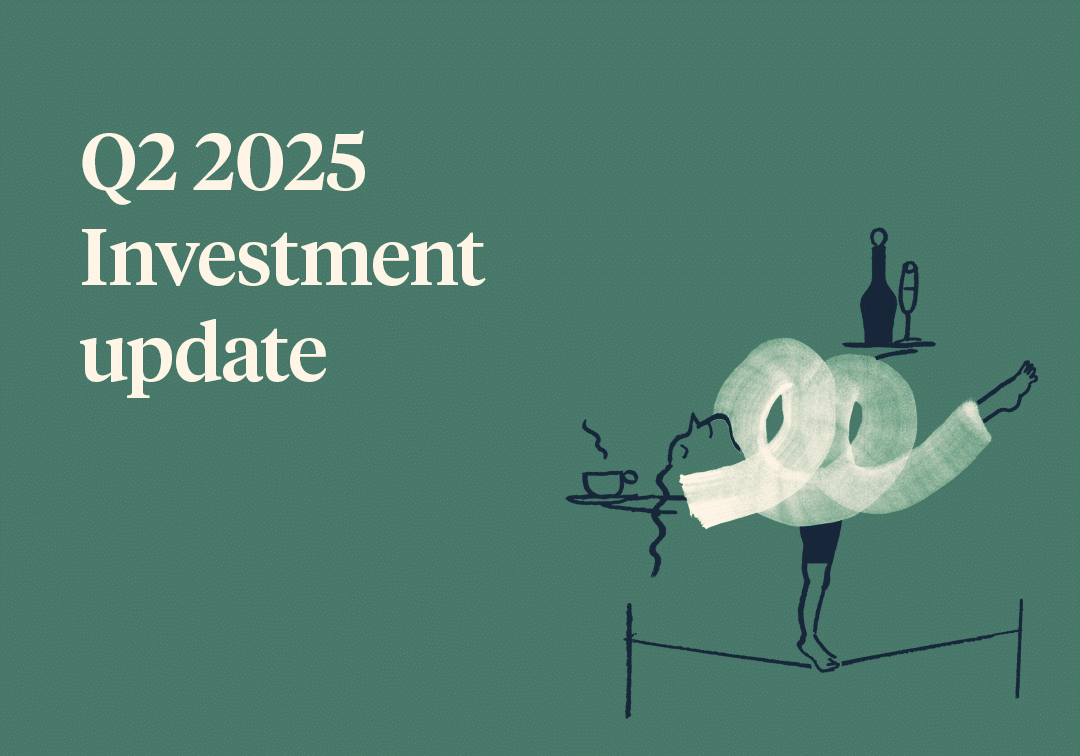Transcript
Tom Merchant:
Hi, good afternoon or good morning I suppose depending on what time you’re listening into this. Welcome to our Q3 investment update. My name’s Tom Merchant, I’m a partner of the firm and I’m delighted to be joined by our CIO, David Cooke this afternoon. David, hi.
David Cooke:
Hi Tom.
Tom Merchant:
Good. As normal, the purpose of this session is to give everyone listening in a sort of high level overview of what we’ve been doing within the investment team in relation to the markets over the last quarter. And I would encourage everyone, if you feel like we haven’t gone too deep into a topic that you would like to hear more out of, I would encourage you all to read the reflections of the CIO, which will be following up this as well, where David will be looking a little bit deeper than what we’re covering today. So I suppose David, throwing the mic over to you. I appreciate with a lot of things going on politically in the UK, I think more of the focus has been on around sort of the tax posturing and some of the elements to do with domestic politics. So maybe a little bit of less tabloid inches I suppose, about the markets themselves. So maybe we could start off with them if we maybe touch on what’s been going on in the markets from your sort of point of view.
David Cooke:
Yeah, it’s been very interesting and a very good quarter for portfolios, and a lot of it is related to politics, just not British politics. I think one of the major drivers of making lots of assets go up is a reduction in uncertainty around policy initiatives in the United States, particularly the tariffs and also a reduction in uncertainty around some economic data. So that’s what drove that performance in the early part of the last quarter essentially, because all the tariff announcements that we had in April and May of this year, which caused such a panic because they were so much more aggressive than initially thought, these tariffs had basically been enacted by the 1st of August and various deals had been cut and the eventual outcome whilst a shift, was not as bad as the initial shock and market movements of April and May had implied. So you’re getting more recovery from that.
You also had the, in America, the one Big Beautiful Bill Act, which was a whole host of policy changes that passed as well. So that reduced the uncertainty around what the Trump administration was doing, which had caused a little bit of chaos in April. And simultaneously with that over the last few months, we’ve seen economic data. We’re not really that sure about how strong the economy was, where inflation trends were. And that economic data in general has been better than expected. That means growth has been better than expected and inflation less of a problem than expected. And you get confirmation from this from the corporate sector, which had a reporting season saying, profits are fine, thank you. So you put those two things together and you get quite powerful boost momentum, which is then accelerated in September by a cut in interest rates in America, which they hadn’t been cutting for about nine or 10 months and they started cutting again.
That kind of added fuel to the fire and you put it all together and we had basically an omni-rally. Pretty much everything everywhere went up. So it was a good quarter, lots of things happening. There were a few things that we should mention that at the same time would make you think even whilst everything’s going up, one of which is the very strong performance from the gold price. And gold’s not usually something you associate with the price rising, when risky things are going up. It’s usually an asset that people hold when they’re risk averse about things. So something’s happening in the gold market and when you dig a little deeper into it, there’s two things going on there. One is that central banks outside of America are buying more and more gold instead of dollars because they see holding dollars as a risk because they can be confiscated or sorry sanctioned if there’s geopolitical tension.
So that’s one of the drivers, which is, it’s just reflecting the fracturing and geopolitical relationships. This is not a long-term positive, but the other thing is that the interest rate cut in America also boosted the gold price, but the interest rate cut in America was mainly because the labour market in America is showing signs of weakness. So there was a signal that whilst everything was rallying in market terms and portfolios were strong, that the future may not be as supportive. This upwards-only economic expansion may be cooling to the point that it needs some support. So it’s like a little signal amidst all the good news that maybe things are going to moderate for the future.
Tom Merchant:
Fine. Understood. So maybe some of the negative sentiment around sort of domestic politics and some of the maybe social side of things sort of maybe made it feel like it was going to be more bumpy than it actually was based on the actual market performance. So from my takeaway from that is that actually there was a pretty strong rallying. While things might feel quite shaky and uncertain sort of socially, actually the market data has been pretty strong in this quarter.
David Cooke:
Yeah. And that’s mainly a factor because the portfolios, investment portfolios at Saltus are global in nature. So even though we live in the UK and we live and feel everything that goes on here, the portfolios are much, much more international and driven by international trends. If we look at the UK, then what you say was reflected in UK assets because we and France have had some political issues in the last quarter and that has meant that our equity markets have lagged everywhere else. It’s really the Americans and Asia and emerging markets in Japan have been strong and UK and Europe have been much less strong in the last three months.
And also our bond market has been quite volatile, particularly in government debt. It’s got a long-term maturity. There are some concerns which are directly around the growth issues in the UK and what may or may not transpire in the upcoming budget. So there are very much UK-specific issues that maybe our clients are thinking, I mean that things are more uncertain or not great if you have 100% UK perspective only. But the investment portfolios are much more global and international and moved by international forces more than domestic.
Tom Merchant:
Fine. So yeah, talking about our portfolios then, obviously they are relative underweight comparative to our peers in the UK. Do you mind touching on maybe what we did in the quarter? And sort of I suppose we were talking about rallying there, so hopefully we had sort of a good quarter for our portfolios, but do you mind maybe telling people-
David Cooke:
Sure.
Tom Merchant:
What we’ve done differently?
David Cooke:
Sure. The thing is we pre-positioned for the rally role and trying to do something in the middle of it. So I suppose our big call was as we’ve had for the last couple of years, is to keep the risk on, so to speak, and not try and take some money off the table and put it to the side. So we very much kept the portfolios well-risked. The only thing we did kind of in the middle of the period was correct or change the balance between the US and rest of the world equity weightings. In the past for, let’s say a year and a half, we’ve been moving away from having more American assets than the rest of the world in terms of stock markets. So selling down America and buying rest of world, valuation reasons. And by the time we’re in April and May, that looked like a good idea, but over the summer we thought this is too early to call how these policy impacts are going to really change both the European and the world outside the United States and the United States itself.
And rather than have a skew geographically between us and everything else, we’d rather have a balance. So we slightly tacked back to more of a 50, 50 kind of exposure by geography between the United States and the rest of the world. It wasn’t a big adjustment, but we’d rather be balanced rather than slightly skewed at this point. So that was the only thing that really changed. But as I say, the big call was to keep the risk on. We’ve had a glass half full rather than half empty attitude. In this quarter, the glass was full, full. It was a really strong quarter and I think we’ll keep the risks on in a balanced fashion looking forward, but that could change.
Tom Merchant:
Fine. Understood. And obviously you mentioned what we’re going to do looking forward. So are we thinking we’re going to continue to keep our weighting with US and the rest of the world balanced, or are we thinking about being more in the US? What’s our sort of thoughts in terms to our geographical positioning?
David Cooke:
I think we can expect a moderation in returns because we’ve had the best part of three years of pretty strong returns. And if you look at the mix in the United States or even globally, the mix between growth slowing and inflation picking up is expected to deteriorate in the next three months. So there are reasons why things, the mood music should be less supportive than it was. So in that sense, we’d expect a moderation. That doesn’t mean that it’s going to be bad. That does mean that it’ll be glass more half full than half empty. There’s another big thing that we’re going to have to mull very carefully over the next quarter, which is the concentration of stock market indices performance around the artificial intelligence theme. In short term, whether you’re in Asia or the United States or Japan, a lot of the equity market performance is dominated by technology companies who are benefiting from a huge spend around artificial intelligence enabling technologies.
And that’s causing a clustering around one theme and a concentration in the index. And generally as portfolio managers, you want diversification rather than concentration and it’s getting quite big. And the valuations implied some of the companies in here are getting quite high. So it’s looking like this AI theme had better play out profitably because there’s an awful lot of money riding on it. And we have to think about that risk for the minute at this point in time and how we’re going to handle it in the future. And that’s not an easy question to answer. I put it together. One big issue to think about and a moderation in trends to be expected after such a strong rally. But we put the two together and it would be glass half empty, one half full running to the end of the year. But beyond that, there may be some changes.
Tom Merchant:
Perfect. That’s really helpful. Thank you, David. And I suppose so if from our point of view moving forward, if you do have any further questions, please do reach out to your adviser. Please do read the reflections of CIO. David spends a lot of time writing them and I always assure him that lots of people read them, so any feedbacks also really welcome. But I suppose from my perspective, David, thank you very much for your time and for anyone listening, thank you all for tuning in and yeah, look forward to speaking to you all the end of the year. Thanks. All the best. Bye-bye.
David Cooke:
Bye.


